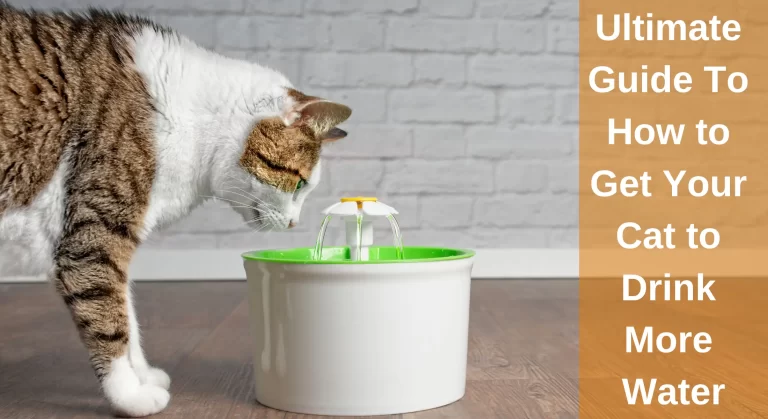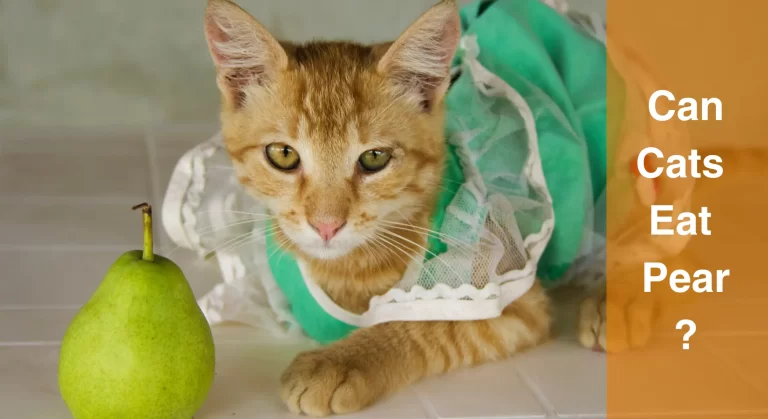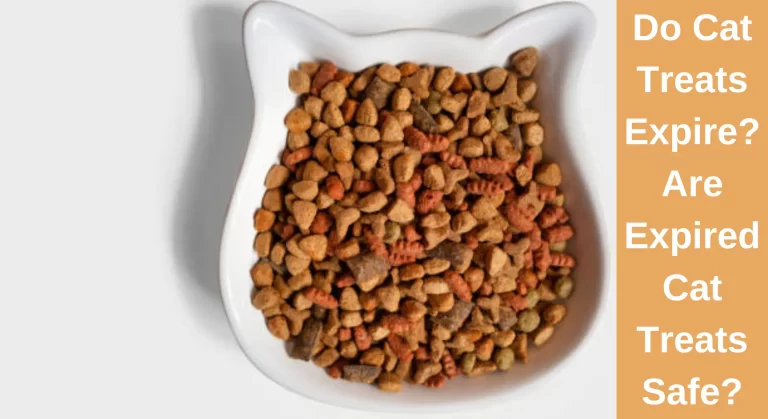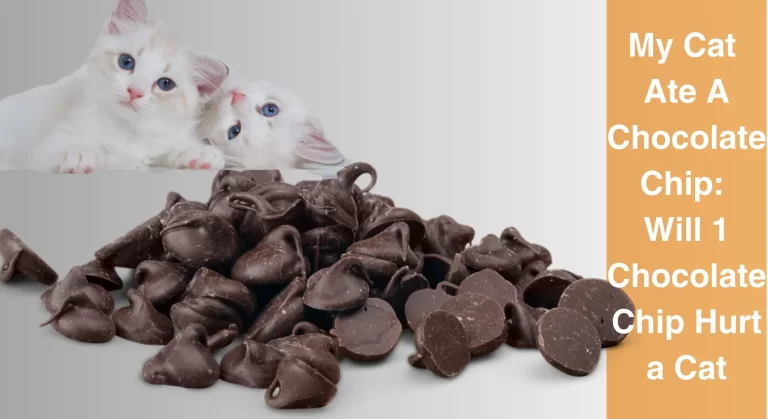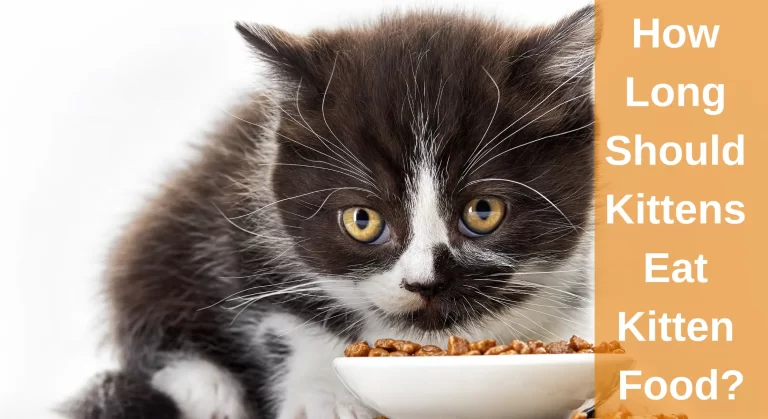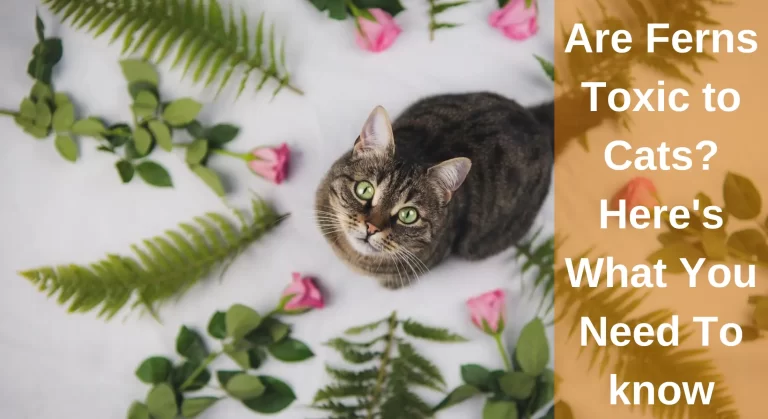Can Cats Eat Cantaloupe? Benefits And How to Feed
Cantaloupe is a popular sweet beach fruit and offers a cooling effect. This low-calorie fruit is packed with vitamins and high water and fiber ratios. But can cats eat cantaloupe and benefit from its cooling effects and healthy vitamins?
Yes, your felines can eat cantaloupe and won’t get poisoned. But before giving them cantaloupe, consult your veterinarian and give your feline a little. The reason is that all felines don’t have the same stomach conditions. Some felines may not react to eating cantaloupe, while others may get stomach problems.
For many reasons, felines worldwide appear to enjoy this delicious fruit truly; therefore, many cat owners are concerned about cantaloupe benefits for felines. So, in this post, we’ll address why felines love to eat cantaloupe, its benefits and hazards, and how you can feed cantaloupe to your feline.
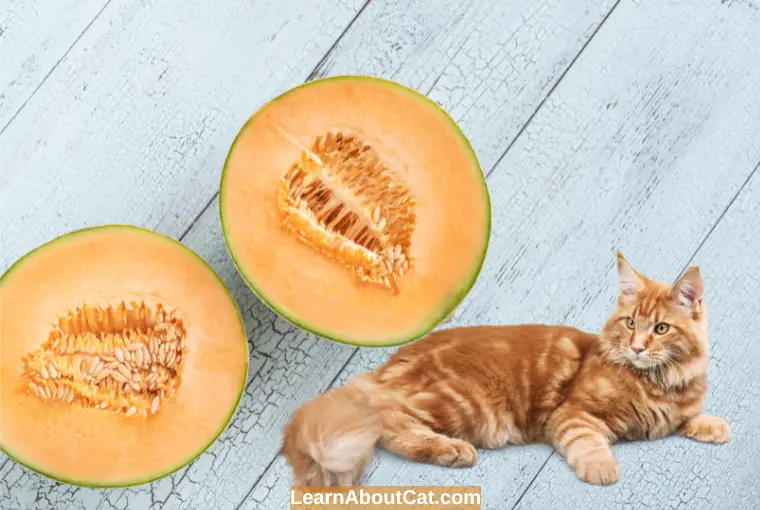
Why Do Cats Like Cantaloupe?
The smell of cantaloupe is similar to the aroma of flesh to cats; that’s why they like it. Since cats cannot detect sweetness, they don’t like cantaloupe’s delicious pulp. The cat believes they’re eating red meat because of the scent of the cantaloupe.
As you know, food’s smell is recognized by volatile compounds that let your cat recognize and determine if it’s suitable. Cantaloupe volatiles is produced via amino acids. Also, the protein comprises amino acids, which are its chemical-building components. As obligate carnivores, felines can only obtain and digest the proteins they need from meat.
So, when cats sniff the scent of cantaloupe, they mistakenly believe they’ve discovered a new form of meat due to the amino acids in its aroma.
Also Read: Can Cats Eat Lychee?
Can Cats Eat Cantaloupe?
Yes, cats can eat cantaloupe in small amounts as an occasional treat. Cantaloupe is a safe fruit for cats to eat as long as it is given to them in moderation and without the rind or seeds, which can be difficult to digest.
However, it is important to note that cantaloupe should not be a regular part of a cat’s diet and should only be given as an occasional treat.
Additionally, if your cat has any underlying health issues or is on a special diet, it is always best to consult a veterinarian before introducing new foods.
Find Out: Can Cats Eat Honeydew?
Is Cantaloupe Safe for Cats?
Yes, cantaloupe is generally considered safe for cats to eat in small amounts as an occasional treat. Cantaloupe is a good source of vitamins and minerals such as vitamins A, C, and potassium, which can benefit a cat’s health. Although, cantaloupe overconsumption might result in hyperglycemia and excess weight.
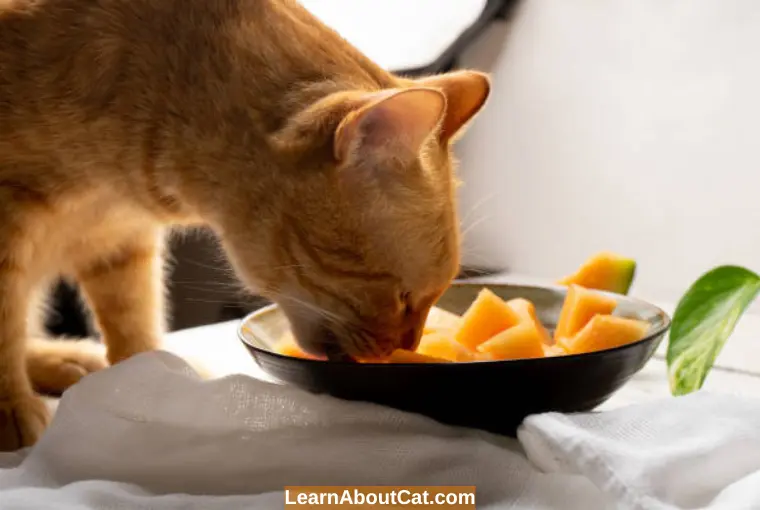
Even though it’s healthy, cantaloupe has a significant amount of sugar. However, offering your feline a small quantity of cantaloupe is fine. But if you regularly feed this to your feline, you will risk your cat’s health.
You should limit the quantity of cantaloupe you feed your feline because cats have difficulty digesting plant-based food.
Since felines are carnivores, their gastrointestinal tract can only break down the meat. Plant-based foods can be highly challenging to digest, which may cause your cat’s digestive system to become irritated.
If you feed your feline cantaloupe, start with a very tiny serving. You must keep an eye out for any negative reactions in your feline. Always seek guidance from your vet if you’re hesitant to feed your cat cantaloupe.
Check Out: Can Cats Eat Cranberries?
Health Benefits of Cantaloupe for Cats
Felines can enjoy the health benefits of cantaloupe in the following ways:
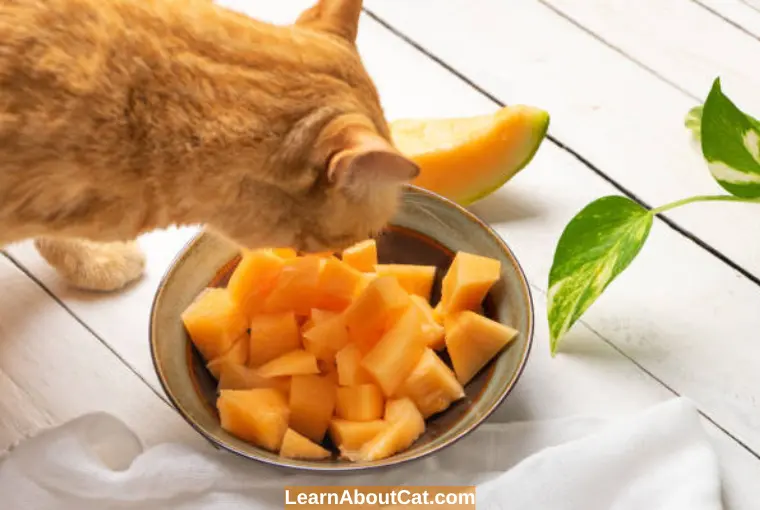
1. Less Calorie and High-Fiber Fruit
Cantaloupe is a pleasant and healthful treat for your cat because it contains low calories and is rich in nutritional fiber.
2. Good Source of Vitamins A and C
Cantaloupe is rich in vitamins A and C, which are important for maintaining healthy eyesight, skin, and immune system in cats.
Cats require vitamin A since their body can’t naturally make it. A cat’s complexion, furry coat, and “night vision” can all benefit from vitamin A. It’s also known to strengthen their immunity. In addition, vitamin A is crucial for the growing phase of kittens and pregnant women.
3. Antioxidants Source
Antioxidants exist in bulk amounts in cantaloupes. Cells damaged by reactive oxygen molecules like radicals can be repaired or protected with antioxidants.
Antioxidants are essential to help your feline recover from an inflammation injury. Antioxidants may also help prevent cancer, according to some research.
4. Potassium Source
Potassium is abundant in cantaloupe, which is essential for felines. Hypokalemia can result from a cat’s food having insufficient potassium. Because of their frequent kidney issues, older cats frequently experience potassium deficiency.
A tiny quantity of cantaloupe can help to deal with it; however, if you’re worried about the condition of your feline’s kidneys, talk to your vet immediately.
5. High Water Content
Cantaloupe has a high water content, which can help keep cats hydrated and support their overall health.
Dangers of Cantaloupe for Cats
Feeding cantaloupe to felines has a few serious disadvantages that are as follows:
- High-sugar fruit: Cantaloupe has a lot of sugar, and felines who consume a lot of sugar may develop diabetes, be overweight, and have other medical conditions.
- Allergic issues: Cats hypersensitive to cantaloupe or other fruits can experience side effects like irritation, dermatitis, and gastrointestinal issues.
- Nutrient deficiency: Cantaloupe is a wonderful source of antioxidants and minerals but doesn’t contain all the essential minerals felines require to survive. Cats need nutrition mainly composed of fatty acids and protein rather than carbs.
- Choking issues: Cantaloupe seedlings and peel can cause choking hazards for felines; therefore, it’s important to remove these components while serving the fruit to your feline
- Gastrointestinal issues: Overindulging in cantaloupe might cause some felines to experience diarrhea and stomach problems.
It’s critical to observe these potential dangers and provide cantaloupe to felines as a treat only, not a normal diet component.
Intresting Reading: Can Cats Eat Cake?
How to Feed Cantaloupe to Your Cat
You can only feed the pulp of cantaloupe to your feline. Avoiding giving your cat the peel or the seedlings.
De-seed the cantaloupe and cut it into small, bite-sized chunks, preventing your feline from choking on a larger piece. Remember that an obligate carnivore’s canines aren’t similar to ours, so your feline can’t chew the cantaloupe properly while it’s in its mouth.
If you let your feline eat the peel, it may get a bad stomach. They might become ill from exposure to germs or pesticides if you haven’t cleansed the peel.
You can also combine a small amount of cantaloupe with cat chow to ensure that your feline will get some crunchy flavor while eating cantaloupe. After consuming cantaloupe, if your feline displays any symptoms of illness or lethargy, contact your vet as soon as possible.
Things to Watch for and When to be Concerned
You may need to think about the following before giving your feline cantaloupe:
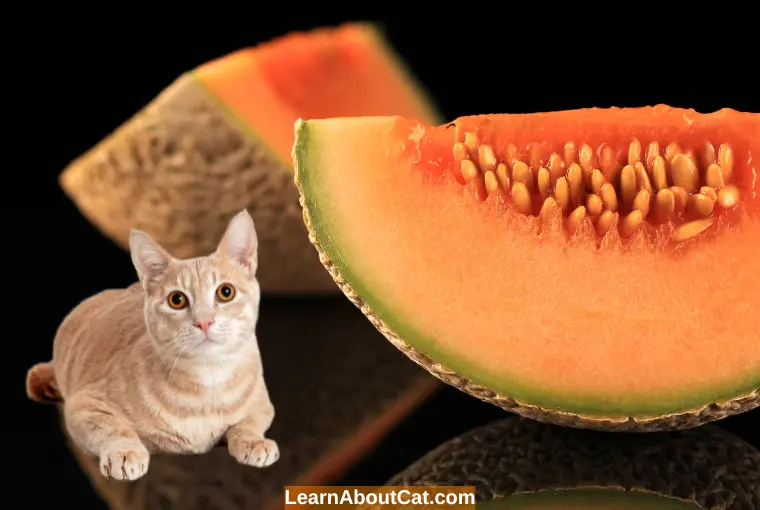
1. Make it a Fun Treat
You may put the cantaloupe reward in a jigsaw box to encourage your feline to consume it. They will get psychologically stimulated and have a stronger need to eat.
Additionally, it’s a wonderful technique to prevent them from consuming their reward at once. Just make sure to wipe the puzzle box to prevent any cantaloupe remnants from spoiling.
2. Serve the Cantaloupe as a Reward
Feeding your feline cantaloupe isn’t meant to substitute for their regular food; therefore, you must be careful not to overeat your feline friend.
Long-term health consequences due to eating excess cantaloupe include hyperglycemia and excess weight.
3. Check to See If the Cantaloupe is Fully Grown
Ensure the cantaloupe you give your feline is always ripe and in season. Your cat may have diarrhea and tummy distress after eating unripe cantaloupe. Color, scent and stalk are indicators of a ripened cantaloupe.
A greenish cantaloupe shouldn’t be eaten. A cantaloupe is mature when it turns desert yellow or golden in hue. Cantaloupes that still have some stalks on them were likely cut before they were fully mature. The cantaloupe must be solid, neither soft nor hard as a stone.
Frequently Asked Questions
How much cantaloupe can a cat eat?
Serve only a little piece of cantaloupe to your feline as a treat. Cantaloupe is okay for felines to consume, but only when a tiny portion is consumed. Cantaloupe overconsumption can disturb the stomach, create discomfort, and other health issues.
Which parts of cantaloupe cat can’t eat?
You mustn’t give your feline the rind and seeds of cantaloupe as it may irritate their stomachs or increase the chances of choking.
Can kittens eat cantaloupe?
As you know, kittens have developing stomachs, so it’s advised that you should provide them with cantaloupe in a minute amount, or if they’re sensitive to fruits, you shouldn’t feed them this fruit.
What is the healthiest fruit for cats?
Cats can safely consume blueberry, blackberry, raspberry, strawberry, and banana. They include significant amounts of fiber, antioxidants, and necessary vitamins. Moreover, chop each fruit into bite-sized pieces before serving to prevent choking risks.
Can cats eat watermelon?
In balance, felines can consume watermelon. It contains few calories and high-water content. Moreover, it also contains several micronutrients, including potassium, vitamins A, B – complex, and C. Watermelon must be given as a treat because it contains sugar in bulk amounts, so it shouldn’t make up a large portion of your feline’s diet.
Can cats eat pineapple?
Yes, felines can enjoy tiny amounts of pineapple only as a snack. Vit C, magnesium, and potassium are essential nutrients in pineapple.
Final Verdict
Despite being natural carnivores without a sweet tooth, cats seem to like eating this delicious fruit. If you have a feline, you might be thinking about whether it’s okay to give it this fruit or whether doing so would be harmful to it.
Fortunately, eating cantaloupe won’t harm your cat’s well-being. They won’t gain any health advantages from it, but they can consume it at a limit without any hazards to their health. Cantaloupe’s mineral content and vitamins will benefit us, but they won’t do anything to benefit your cat. Therefore, it’s advised to feed a little piece of cantaloupe to your feline and keep an eye on them for any reaction.
Related Posts:
Who is Isabella?
My name is Isabella, and I am a dedicated and knowledgeable cat enthusiast. With years of experience caring for cats and a deep love for felines, I made a mission to help other cat lovers navigate the challenges of cat ownership.

